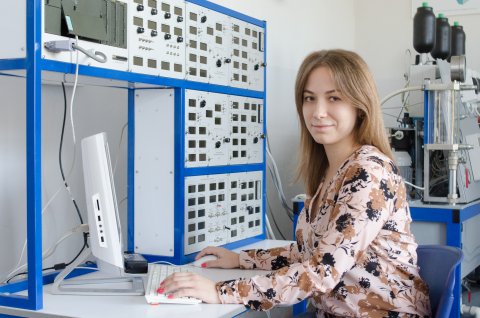Today, high-technology solutions allowing to upgrade production processes are in especially high demand. South Ural State University has something to offer for the existing demand. A valveless pump designed by the SUSU scientists is known for its high reliability, as well as for a smaller degree of damage that it might inflict on transmitted materials due to the absence of moving elements in its flow part. This innovation may find application in food, medical and nuclear industries.
This valveless inertial pump with hydraulic piston displacer was engineered by a postgraduate of the SUSU Daria Khabarova, who was one of the winners of the Prospects of Science contest under Project 5-100. Her academic advisor is the Head of the Department of Hydraulics and Hydropneumosystems, Doctor of Sciences (Engineering) and Professor Evgenii Spiridonov.
“I’m studying valveless pumping units used in nuclear, food and medical industries for transmission of materials,” says Daria Khabarova. “Key requirements to pumps in these sectors include high reliability and absence of damage inflicted by the pumps’ elements on the transmitted materials. Piston or membrane pumps with hydraulic diodes (flow elements without moving mechanical parts) belong to this very type of pumps. At the moment, we are searching for a structural scheme of a hydraulic diode which would be most efficient in the context of its use in pumping units.”
Research-and-development work in this field has been in progress for a relatively long time now. Starting from the 70’s of the 20th century the engineers of a famous Japanese automobile brand had been studying the operational process of a piston pump with no valve-actuating gear in it. Their research proved that a pumping effect in such a hydraulic machine was possible. Today, the most renowned company releasing hydraulic machines of this type to be used in nuclear industry is a company from the USA. Structures of highly-reliable units are being developed under Power Fluidics field.
“Safety issue in nuclear industry is among the most topical ones, since any accident may have dramatic consequences. In this sector highly-reliable units are used in the reactor cooling systems,” says Daria Khabarova. “Valveless micro-pumps with hydraulic diodes are widely used in medical industry, for instance, for transmitting and dosing of medicines. These pumps are usually a low-power kind and have a relatively low efficiency. Our task is to improve them. Unfortunately, we know nothing about the use of such pumps in food industry.”
It is obviously reasonable to use such pumps in food industry, thinks Daria Khabarova. Using pumps with no moving elements in their flow parts will allow to preserve sensitive texture of food products. Moreover, such structure may be used in other sectors of industry.
.jpg)
By now, the University’s team of scientists has completed theoretical studies of the pump’s operational process. To obtain adequate characteristics, experimental studies of the operational process and of certain elements of the pump are required. Today, the experimental research is carried out with regard to studying characteristics of the main elements — hydraulic diodes. The next phase will include analyzing of the obtained results and using them in the pump’s structure.
“Once the project is complete, I’m planning to further study the properties and characteristics of hydraulic diodes, as well as the possibility of using them to improve equipment. We already have some ideas about it. For instance, it is possible to make use of inertial properties of fluids, and design optimal flow part of the vortex diode for its complete shut-off in one direction in case of cyclic change of flow direction in it.”
This scientific project is being fulfilled in collaboration with the leading company in engineering and manufacture of hydraulic-valve equipment and axial-piston hydraulic machines at the Russian market (Yekaterinburg). Some of the results were presented at the 3rd International Rotating Equipment Conference in Germany.
Today, this field is among the most promising ones. The research results will allow to take another step towards improvement of production processes.




